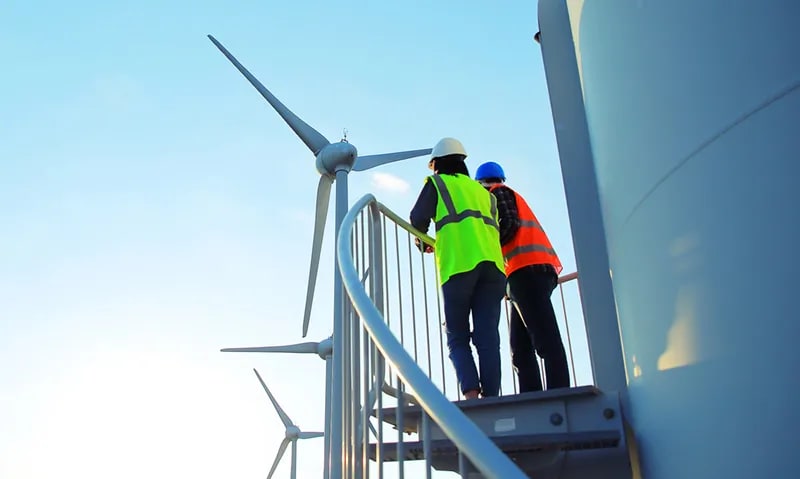How To Become a Wind Turbine Technician
Does renewable energy interest you? UTI can help you train for a career in the field. Learn how to become a wind turbine technician by reading our post!
Field service technicians are sort of like doctors—but for machinery.
They go from location to location, treating their “patients,” which are complex machines that are responsible for many important functions in some of the world’s most essential industries.
Field service techs work for a variety of businesses, from those in information technology to those in heating, ventilation, air conditioning and refrigeration (HVACR). They also play an important role in the renewable energy field.
In wind power, field service technicians may travel across the country, working on big installation projects. They may also visit multiple locations in a single week, repairing wind turbines to get them back up and running so they can provide electricity to power grids.
This exciting field can literally take you to new heights when you climb hundreds of feet in the air to work on wind turbine technology. Keep reading to learn more about field service in renewable energy. You might start considering a wind field service technician career!
Key Points
Wind field service technicians work on wind farms, which are large fields where wind turbines operate. You may have seen wind turbines on a road trip—they’re those huge towers with spinning blades. They’re responsible for taking wind energy and transforming it into electricity that powers homes, businesses, manufacturing plants, schools, hospitals and other buildings that need electricity.
Like any type of machinery, wind turbines can malfunction or break down. They also need to be regularly serviced to operate at optimal levels and avoid malfunctioning. Wind field service technicians are the pros who ensure turbines are working correctly and fix them when they aren’t.
A typical wind field service technician job description might include tasks like the following:
Most of a wind field service technician’s work is on the wind turbine nacelle, which is the part of the wind turbine containing electricity-generating equipment. The nacelle typically houses a generator, brakes and a gearbox. Field service technicians need to have knowledge relating to DC and AC electricity in order to fix these components.

Field service technicians go where the wind takes them. These types of positions are often travel-friendly since new wind turbines are continually being set up on wind farms all over the country and throughout the world. For professionals in this field, there are opportunities for both working in one location throughout a career, as well as traveling from worksite to worksite.
“When I was young, I loved traveling,” says Heath Barrington, senior project manager at Impact Wind, “It was really fun for me to see places in the country that I just never would have gone to if I wasn’t working in the wind industry. If people are wanting to change careers and wanting to get out of the norm of going into an office and want to get out and see the world, I would say the renewable wind industry is where to go, if you’re wanting that adventure.”
Wind turbine service technicians rank as the fastest-growing career in the United States (tied with nurse practitioners), according to the U.S. Bureau of Labor Statistics (BLS). Employment is projected to grow 45% between 2022 and 2032.63
What is a potential field service technician’s salary? According to the BLS, the median annual salary for wind power technicians in the United States was $61,770 in May 2023.61 That means half earned more and half earned less. Keep in mind that salary depends on several factors, including experience, employer, demand and cost of living in the area.
According to the BLS, most wind turbine service technicians attend technical school to learn skills like wind turbine operation, energy industrial fundamentals and safety compliance. In wind turbine technician school, students may study wind technology course topics like:
Employers may also look for skills like communication since field service technicians need to effectively communicate issues to clients and teammates. Wind field service technicians also need to be able to work with wind tools and equipment and have the physical stamina and strength to perform their duties.
The demand for wind turbine service technicians is projected to grow over the next decade— which means a positive career outlook for aspiring techs. As more industries get electricity from wind power, the need for field service technicians to work on the turbines that provide it also grows.
You can learn the skills you need to pursue a wind field service technician career in the Wind Turbine Technician program at UTI.1It takes less than a year to complete and once you graduate, you'll be ready to pursue a career in this exciting industry.
To learn more about the program, request to speak with an Admissions Representative online or by phone at 1-800-834-7308.
Universal Technical Institute of Illinois, Inc. is approved by the Division of Private Business and Vocational Schools of the Illinois Board of Higher Education.